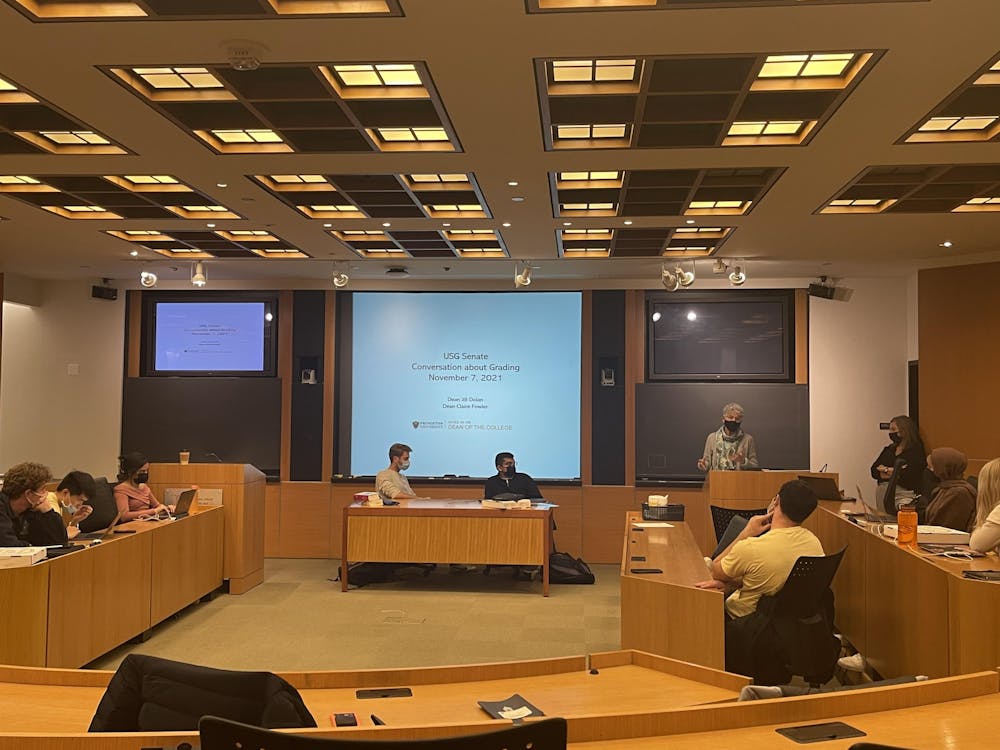When the Undergraduate Student Government (USG) Senate met on Sunday, Nov. 7, they voted to amend the Honor Code Constitution in addition to discussing grading policy and the atmosphere around grading on campus.
Chair of the Honor Committee Wells Carson ’22 submitted an amendment that would formally establish the Peer Representatives as an Honor Committee resource available to students who have been accused of violating the honor code.
Since their charter in 2017, Peer Representatives have been an Ad Hoc committee of the Honor Committee, meaning they were initially established for a limited period of time.
The amendment was unanimously approved by the Senate, after being unanimously approved by the Honor Committee on Oct. 31.
Dean of the College Jill Dolan and Senior Associate Dean of the College Claire Fowler presented at the meeting as well. They opened a discussion regarding class grading.
They prefaced the discussion by saying that they easily receive feedback from faculty on the subject, but they would like to use USG meetings as an outlet to more frequently discuss student opinions and attitudes toward grading policy.
Sustainability chair Mayu Takeuchi ’23 asked them to expand on what motivated their desire to initiate these discussions.
“The steep increase in the [amount of] ‘A’ grades,” Dolan answered. “What I’m most concerned about is what it means.”

Dean Dolan referenced a graph from her presentation showing the course grade point average for all undergraduate courses since 1985, highlighting the fact that there has been a .172 point increase since the 2015 academic year.
In response to this data, Class of 2022 senator Reade Ben suggested that grading among departments is very different.
“What an ‘A’ means to an AB student studying history is very different from a BSE student who wants to become an engineer,” he said.
Several members of the USG Senate participated in the discussion, making points about Pass/D/Fail policies, pre-college academic experiences and their effects on performance in college, as well as the competitive culture surrounding academics and the effects of college grades on students’ post-graduate prospects.

The Deans also explained the recent history of grading policy. In 2004 the Faculty Committee on Examinations and Standing instituted a policy that limited the amount of A’s that a professor could give to students in one class. This policy was reversed in 2014, before Dolan was selected to become the Dean of the College.
“After that, the assumption was that the departments would take control of how they grade students,” Dean Dolan said. “Grading is local, and it’s also very discipline specific.”
Dean Dolan also provided data on the percent of courses that students selected to PDF. During the spring of 2020, the percentage of courses that were PDF-ed more than tripled.
In an attempt to provide a student’s perspective to Dean Dolan on the University’s PDF policy, Class of 2022 Senator Brad Phelps shared a personal anecdote.
“I think I’m going to PDF my language class,“ he said, eliciting a laugh from those in attendance. “It’s because I care about learning the language that I want to have that option,“ he added.
Senate vice president Ashwin Mahadevan ’22 suggested that grades might not affect learning as much as some think they do.
“Going into a class, I don’t think [about my grade in that class]” he said. “Which is why I don’t think [grading] impacts the learning as heavily as you might think it does.”
The conversation ended with a dialogue on the competitive culture of academia in the U.S., with Dean Dolan emphasizing that education is multifaceted.
“Teaching and learning is a dialogue, assessment should be a part of that dialogue,” Dean Dolan said towards the end of the meeting.
The Senate also unanimously approved the confirmation of two new members to the Honor Committee. Out of 12 applicants, Amar Abou-Hussein ’25 and Seth O’Connor ’25 were selected by the selection committee, which is composed of members of the USG and the Honor Committee.
USG Senate meetings are held in Robertson Hall Room 016 at 8 p.m. on Sunday evenings and are open to all.
Andrew Somerville is a staff writer who corresponds with and covers USG happenings and other campus news. He can be reached at jas19@princeton.edu.








